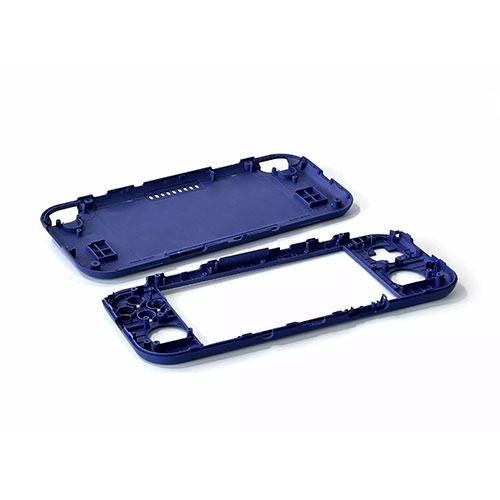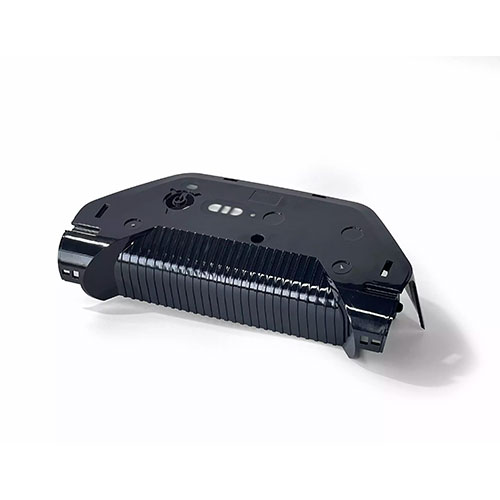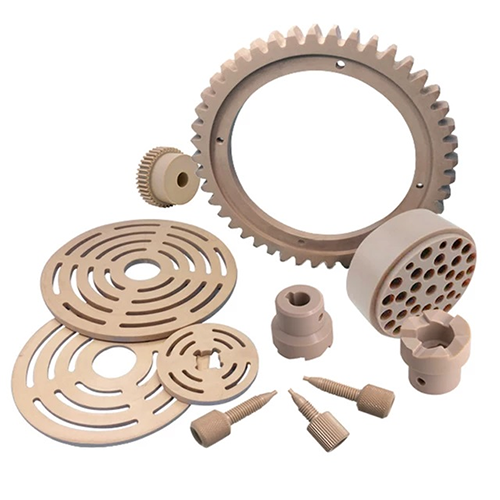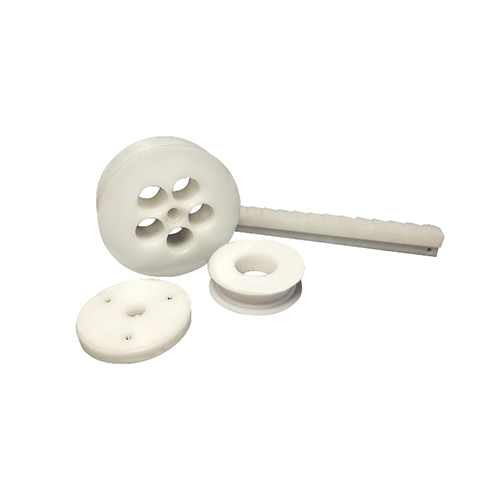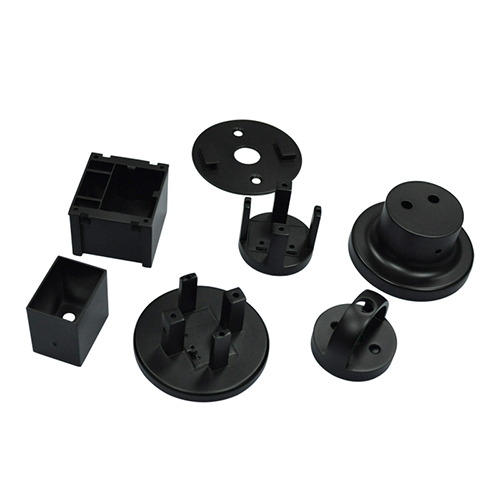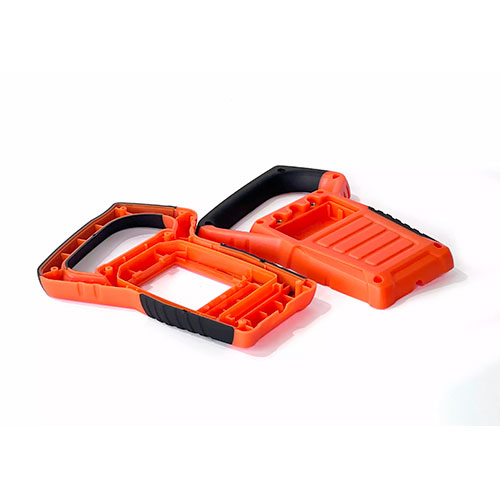ABS Injection Molding Service
Custom ABS Injection Molding Service
Customized ABS Plastic Injection Molding Solutions at Competitive Prices. From prototyping to full-scale production, NOBLE leverages unmatched engineering expertise to deliver high-quality ABS parts and prototypes quickly and efficiently.
- Advanced Equipment & Cost-Effective Price
- 10+ years of ABS Injection Molding Experience
- ISO 9001 & ISO13485 Certified Factory
- Molding Parts As Fast As 2 Days
- Instant ABS Injection Molding Quotes
- 24/7 Engineering Support

Our ABS Injection Molding Capabilities
NOBLE provides reliable, customized ABS injection molding solutions at competitive prices, from prototyping to full-scale production. This enables you to quickly obtain high-quality, stable, and high-precision ABS injection molded parts with excellent appearance and performance.
| Price | $$$ |
| Lead Time | <6 days |
| Wall Thickness | 0.045 in. – 0.140 in. (1.143mm – 3.556mm) |
| Tolerances | +/- 0.003 in. (0.08mm) with an included resin tolerance that can be greater than but no less than +/- 0.002 in./in. (0.002mm/mm) |
| Max Part Size | 18.9 in. x 29.6 in. x 8 in. (480mm x 751mm x 203mm) |
| Available ABS at NOBLE | Polylac PA-746, Polylac PA-765, Cycolac MG47, Lustran 433, Lustran PG298, Lustran 348, RTP 605 (30% GF) |

Characteristics of ABS Injection Molding Materials
ABS is a versatile material with excellent processing characteristics for injection molding, extrusion, thermoforming, and machining. Injection molding is a precise and efficient method for producing ABS plastic parts. ABS injection molding offers several advantages, including high precision, ease of processing, and versatility. Thanks to its unique properties, ABS is widely used in industries such as automotive, electronics, telecommunications, and construction, particularly for parts that require impact resistance, aesthetic appeal, and efficient mass production.
| Features | Info |
| Subtypes | General Purpose ABS, ABS + PC (Polycarbonate), Flame Retardant ABS, Conductive ABS, High-Impact ABS |
| Process | Injection molding, CNC Milling, CNC turning, laser cutting, drilling and tapping |
| Tolerance | +/- 0.003 in. (0.08mm) with an included resin tolerance that can be greater than but no less than +/- 0.002 in./in. (0.002mm/mm) |
| Applications | Automotive Parts, Electronics, Industrial Equipment, Medical Devices |
| Finishing Options | Polishing, Painting, Chrome Plating, Laser Etching, Surface Coatings, |
Pros and Cons of ABS for Injection Molding
ABS is a versatile engineering plastic commonly used in injection molding due to its good strength, impact resistance, and excellent dimensional stability. Proper injection molding techniques, including temperature control, material drying, and mold design, are crucial to optimize the performance of ABS in molding processes.
Ease of Injection Molding
ABS is relatively easy to mold and has a lower melting point compared to high-performance plastics, which makes it easier to process.
Good Bonding Properties
ABS can be easily bonded using various methods such as ultrasonic welding, adhesives, or mechanical fasteners. This versatility makes it suitable for creating durable, long-lasting assemblies in industries like automotive, consumer goods, and electronics.
Good Strength-to-Weight Ratio
ABS demonstrates good resistance to oils, fats, and some organic solvents, making it suitable for a variety of industrial applications. However, its resistance to strong acids, alkalis, and certain harsh chemicals is limited. Special care should be taken in environments with aggressive chemicals.
Chemical Resistance
ABS demonstrates good resistance to oils, fats, and some organic solvents, making it suitable for a variety of industrial applications. However, its resistance to strong acids, alkalis, and certain harsh chemicals is limited. Special care should be taken in environments with aggressive chemicals.
Wide Range of Uses
Injection-molded ABS parts are widely used across industries such as automotive, electronics, consumer products, and industrial applications. It is highly suitable for functional components that require good impact resistance, toughness, and ease of processing.
Customizability
ABS can be easily modified with various additives, such as glass fibers, flame retardants, and UV stabilizers, to enhance its mechanical properties, wear resistance, or environmental stability. This flexibility makes ABS an ideal choice for applications requiring tailored performance characteristics.
Cost-Effective
ABS is generally more affordable than high-performance plastics like Nylon or polycarbonate. Its balance of good mechanical properties, ease of molding, and cost-effectiveness in high-volume injection molding make it a popular choice for mass production, especially when the performance characteristics of ABS are suitable for the application.

Low Heat Resistance
ABS has a relatively low heat resistance compared to other engineering materials such as metals or high-performance plastics. During injection molding, ABS may soften or lose dimensional stability when exposed to high mold temperatures. Careful control of the mold temperature and cooling rates is crucial during the injection molding process to prevent warping or distortion.
UV Degradation
ABS is sensitive to UV light exposure. Over time, UV radiation can cause the material to degrade, leading to discoloration, brittleness, and a significant loss in mechanical properties.
Not Suitable for High-Load Applications
While ABS offers good strength for many common applications, it is not designed to withstand high-load or high-stress conditions. It is unsuitable for parts that undergo significant mechanical stress or pressure in high-temperature environments, such as in industrial machinery or high-performance automotive parts.
Vulnerability to Certain Chemicals
ABS offers limited resistance to strong acids, alkalis, and certain solvents. While it performs well in environments with oils, fats, and some organic solvents, harsh chemicals like concentrated acids or solvents can degrade the material.
Surface Degradation
Prolonged exposure to UV light or harsh environmental conditions can cause ABS to degrade, leading to issues such as discoloration, cracking, or fading over time.

Types of ABS In Injection Molding Materials
ABS is a versatile thermoplastic polymer that is widely used in injection molding due to its ease of processing, good mechanical properties, and suitability for a wide range of applications.

Polylac PA-746
Offers outstanding mechanical strength, impact resistance, and dimensional stability, along with excellent processability in injection molding for achieving high-quality finishes. It is widely used in industries where tough, durable components with precise dimensions are essential, such as automotive, consumer electronics, and electrical housings.
Tensile Strength (ASTM D648): 40.6 MPa
Elongation (ASTM D648): 30%
Hardness (R-Scale) (ASTM D785): 118
Heat Deflection: 179-205℉

Polylac PA-765
This ABS material provides a balanced blend of strength, flexibility, and ease of injection molding, with good impact resistance and surface quality. This makes it ideal for general-purpose applications, including household appliances and industrial parts, where durability and moldability are required.
Tensile Strength (ASTM D648): 38.1 MPa
Elongation (ASTM D648): 15%
Hardness (R-Scale) (ASTM D785): 100
Heat Deflection: 163-181℉

Cycolac MG47
Ycolac MG47 is a versatile ABS with excellent impact and chemical resistance, as well as superior dimensional stability. It is frequently used in industries like automotive, electrical, and consumer electronics, particularly for components that demand high-quality finishes and injection molding performance.
Tensile Strength (ASTM D648): 44.0 MPa
Elongation (ASTM D648): 15%
Hardness (R-Scale) (ASTM D785): 112
Heat Deflection: 176-201℉

Lustran 433
Designed to deliver a high gloss and exceptional surface finish, combined with strong impact resistance and good dimensional stability. Its ease of injection molding makes it suitable for applications where both appearance and durability are critical, such as automotive interiors and consumer goods.
Tensile Strength (ASTM D648): 42.1 MPa
Elongation (ASTM D648): 30%
Hardness (R-Scale) (ASTM D785): 109
Heat Deflection: 185-211℉

Lustran PG298
Lustran PG298 offers high gloss, impact resistance, and improved processability in injection molding, making it perfect for applications where both aesthetic quality and toughness are necessary. It is commonly used in automotive, consumer products, and electrical housings, where high-quality surfaces and durability are key.
Tensile Strength (ASTM D648): 40 MPa
Elongation (ASTM D648): 30%
Hardness (R-Scale) (ASTM D785): 110
Heat Deflection: 183-201℉

Lustran 348
Provides excellent impact resistance, stiffness, and surface quality, along with high strength and dimensional stability. It is widely used in demanding applications such as electrical enclosures, consumer electronics, and industrial components, where both mechanical performance and appearance are essential in injection molding.
Tensile Strength (ASTM D648): 48.3 MPa
Elongation (ASTM D648): 25%
Hardness (R-Scale) (ASTM D785): 112
Heat Deflection: 183·198℉

RTP 605 (30% GF)
This is a glass-filled ABS material that incorporates 30% glass fibers, significantly boosting its strength, stiffness, and dimensional stability. Ideal for high-load applications, it is often used in automotive components, industrial machinery, and parts requiring enhanced structural performance and rigidity, all of which benefit from injection molding.
Tensile Strength (ASTM D648): 97 MPa
Elongation (ASTM D648): 1% – 2%
Hardness (R-Scale) (ASTM D785): Not Been Tested
Heat Deflection: 200℉
Surface Finishing Options for ABS Injection Molding
Surface treatment plays a vital role in enhancing the appearance, durability, and functionality of injection-molded ABS parts. Each technology offers different benefits depending on the application. Based on your needs, we will customize your injection molding solution to ensure the high precision and competitiveness of your products.
NOBLE has more than ten years of experience in surface treatment and excellent engineers, who are proficient in surface treatment of plastics, metals, and composite materials, and can turn your dream prototype or parts into reality.

Painting
Painting involves Spray droplets can be dispersed uniformly or in fine amounts to cover a wide surface area and bring out greater color to the part.

Polishing
Working on metal and hard plastics, our polishing uses highly efficient machinery to get our parts between Ra 0.8~Ra0.1 for a cleaner surface.

Sand Blasting
Band blasting cleans the surface of any impurities and peels coating through the propelling of blast media streams over the parts.

Electroplating
Electroplating reduces metal cations in the electrolyte solution, producing a metallic coating on a metal surface. This process can be used for purposes of corrosion and wear resistance, as well as for decorative purposes.

Laser Carving
Helpful in brand recognition or parts organization, we use laser carving that applies various printing methods during full-scale production to quickly embed barcodes, lettering and logos on the parts.

Heat Transfer Printing
Heat Transfer Printing applies heat and pressure to transfer designs onto surfaces, creating durable, vibrant graphics suitable for various materials.
Custom ABS Injection Molding Parts Display
Check out our over ten years of custom ABS injection molding parts, including precision ABS prototypes and parts from our valued customers.
Applications of ABS Injection Molding
ABS is one of the most commonly used thermoplastic polymers in injection molding because of its good mechanical properties, ease of molding, and versatility. ABS can be precisely injection molded into complex geometries, making it an ideal choice for prototyping and small to medium-volume injection molding.

Automotive Parts
ABS is widely used in the automotive industry for injection molding parts like dashboards, trim pieces, interior panels, and exterior housings. Its excellent impact resistance, dimensional stability, and ability to withstand high temperatures make it an ideal material for durable, lightweight automotive components.

Aerospace Parts
In aerospace applications, ABS is used for producing non-critical components such as cabin interior panels, fixtures, and instrument housings. Its lightweight, strong, and impact-resistant properties are well-suited for parts that require high performance but do not bear direct structural loads in flight.

3D Printing Prototypes
ABS is a popular material for prototyping in 3D printing, especially when functional prototypes are needed for testing form, fit, and function. It offers good dimensional stability and impact resistance, allowing designers to create precise and durable prototypes before full-scale production.

Medical Devices
ABS is a popular material for injection molding medical devices, including housings for diagnostic equipment, surgical tools, and prosthetic components. Its strength, biocompatibility, and ease of manufacturing allow for precise and safe production of critical healthcare products that meet industry standards.

Consumer Electronics
ABS is commonly injection molded into enclosures, cases, and housings for consumer electronics such as smartphones, computers, televisions, and gaming consoles. Its high durability, ease of processing, and smooth finish make it perfect for creating aesthetically pleasing and protective enclosures for electronic.

Industrial Parts
In industrial settings, ABS is used to manufacture machine components such as valves, housings, brackets, and protective covers. Its resistance to impact, chemicals, and temperature fluctuations makes it an excellent choice for parts that need to endure harsh environments and mechanical stress.
If you are looking for a rapid prototyping manufacturer or a CNC machine shop to fabricate small, medium-volume, or mass-production products, NOBLE is an ideal choice.Our well-trained and experienced staff manufactures parts in line with drawings on modern CNC machines, with the highest accuracy and processing quality in all sizes.In addition, we provide professional design considerations for your CNC machining projects.
Want to get the most professional and fastest service for your CNC machining project? Upload your CAD files now and obtain a quote!

